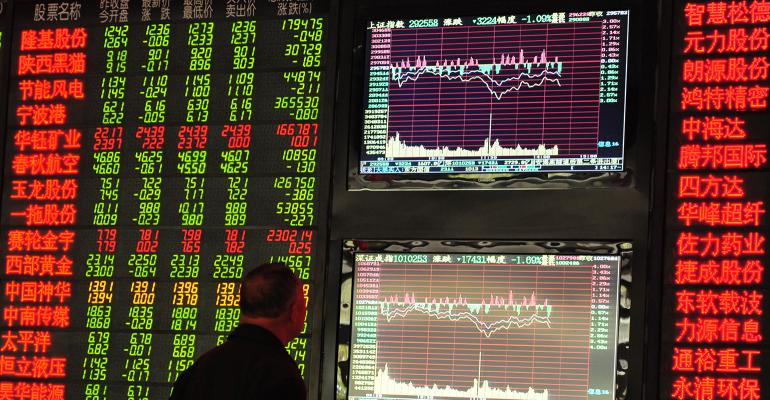By Srinivasan Sivabalan
(Bloomberg) --Even as global markets suffered the worst bout of turmoil in years, commentators from JPMorgan Chase & Co. to UBS Group AG said developing nations would ride out the storm.
JPMorgan’s Diana Amoa said it wasn’t a taper tantrum, while UBS’s Geoffrey Wong dismissed the selloff as a mere blip, predicting a quick rebound. Others, like Ashmore Group Plc’s Edward Evans, insisted emerging markets were well supported by earnings growth.
For a while, it looked like they were wrong. As market after market got sucked into the selloff, emerging stocks erased $1.83 trillion, losing in two weeks what Italy’s economy produces in one year. Valuations fell to a 10-month low and the benchmark index erased its 2018 gains. A 10 percent correction ensued.
But it looks as though emerging markets came out of it looking better than their richer counterparts, especially the U.S.
As the dust settles on the selling spree, here’s what emerged:
Options traders least worried about EMs
While fretting over the U.S., Europe and Japan, derivative traders were the least concerned about emerging markets. Expected volatility, derived from options prices, rose by a smaller degree in developing nations since Jan. 26 than in the developed world. Given that prices typically move in the opposite direction to volatility, emerging markets may be the least impacted by a global rout in the near term.

EM selloff was mainly China’s problem
The world’s second-largest economy saw its equities lose more than $1 trillion, as much as the entire Brazil market, in the past two weeks. Almost 80 percent of all emerging-market losses during the period was in China’s neighborhood, covering India, South Korea and Taiwan. The declines elsewhere were negligible compared to the size of the plunge in these markets.
The only country to see its market capitalization rise was Egypt, which is reaping the rewards of a currency float.

Biggest was not the best
Some of the biggest and deepest markets in the developing world suffered the worst meltdowns. Almost one-eighth of China’s stock market vanished, while South Korea and South Africa lost about a tenth of theirs. In contrast, tiny markets such as Pakistan and Egypt outperformed others.

Cheapest was no hedge
Those who had bet that the most expensive emerging markets would witness bigger losses than lower-valued peers got a jolt. The roll call of the biggest losers included some of the cheapest markets in the world: Russia, South Korea and Hong Kong-listed Chinese shares. They were already trading at single-digit price-earnings ratios before the rout, and sank to mouth-watering levels thereafter.
Futures sentiment quickly rebounded
Whether one might look at the futures market as a signal for expected moves in spot prices, or merely as a reflection of current sentiment, the signs of panic there were unmistakable. Near-month futures on the MSCI Emerging Markets Index fell to the biggest discount to the benchmark in seven years as the selloff took hold. That meant traders saw potential for annualized losses of as much as 39 percent.
But then, the hysteria evaporated as quickly as it had emerged. The futures index swung to a premium, the widest since September 2013. The fluctuations seemed to have settled by Monday and futures traded higher than spot prices.
The MSCI Emerging Markets Index rose for a second day on Tuesday, while the futures gauge maintained its premium.

Technical support kicked in
Price charts suggested the first support for emerging-market stocks would come in at a level where the 100-day moving average of the equity gauge met the 23.6 percent Fibonacci retracement of the two-year rally. The index entered that range on Friday and rebounded on Monday. Unless equities trade below the threshold in a sustained manner, the worst of this phase may be over for emerging markets.

--With assistance from Selcuk Gokoluk.To contact the reporter on this story: Srinivasan Sivabalan in London at [email protected] To contact the editors responsible for this story: Dana El Baltaji at [email protected] Alex Nicholson





